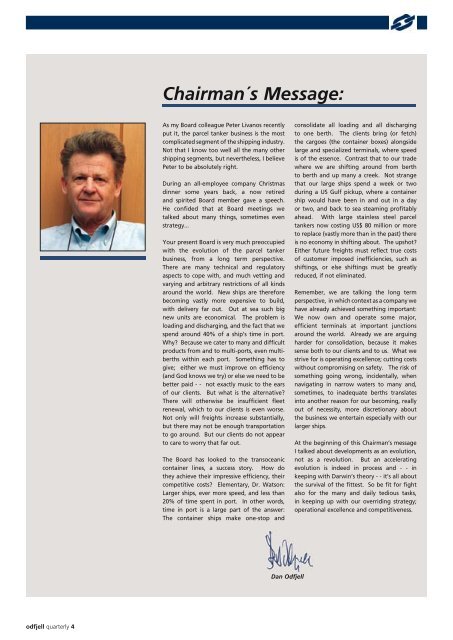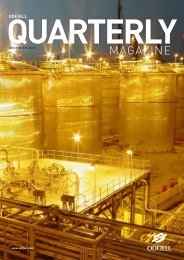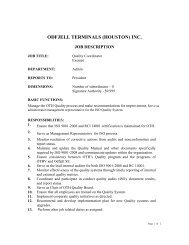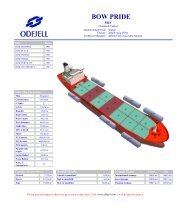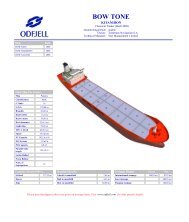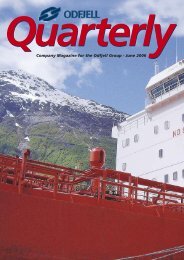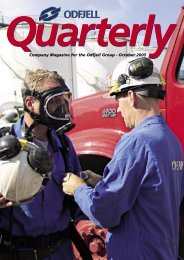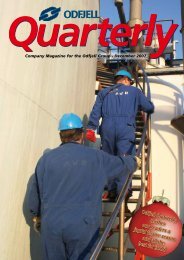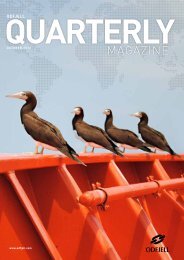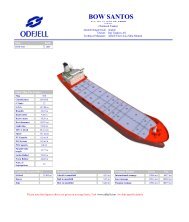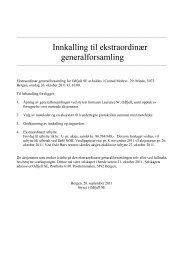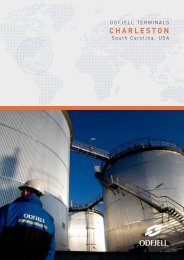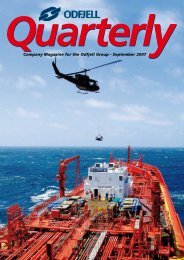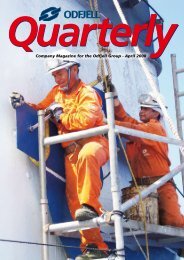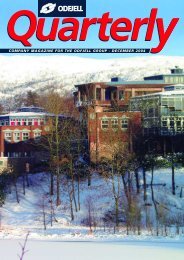Quarterly October 2004 - Odfjell
Quarterly October 2004 - Odfjell
Quarterly October 2004 - Odfjell
- No tags were found...
You also want an ePaper? Increase the reach of your titles
YUMPU automatically turns print PDFs into web optimized ePapers that Google loves.
Chairman´s Message:As my Board colleague Peter Livanos recentlyput it, the parcel tanker business is the mostcomplicated segment of the shipping industry.Not that I know too well all the many othershipping segments, but nevertheless, I believePeter to be absolutely right.During an all-employee company Christmasdinner some years back, a now retiredand spirited Board member gave a speech.He confided that at Board meetings wetalked about many things, sometimes evenstrategy...Your present Board is very much preoccupiedwith the evolution of the parcel tankerbusiness, from a long term perspective.There are many technical and regulatoryaspects to cope with, and much vetting andvarying and arbitrary restrictions of all kindsaround the world. New ships are thereforebecoming vastly more expensive to build,with delivery far out. Out at sea such bignew units are economical. The problem isloading and discharging, and the fact that wespend around 40% of a ship’s time in port.Why? Because we cater to many and difficultproducts from and to multi-ports, even multiberthswithin each port. Something has togive; either we must improve on efficiency(and God knows we try) or else we need to bebetter paid - - not exactly music to the earsof our clients. But what is the alternative?There will otherwise be insufficient fleetrenewal, which to our clients is even worse.Not only will freights increase substantially,but there may not be enough transportationto go around. But our clients do not appearto care to worry that far out.The Board has looked to the transoceaniccontainer lines, a success story. How dothey achieve their impressive efficiency, theircompetitive costs? Elementary, Dr. Watson:Larger ships, ever more speed, and less than20% of time spent in port. In other words,time in port is a large part of the answer:The container ships make one-stop andconsolidate all loading and all dischargingto one berth. The clients bring (or fetch)the cargoes (the container boxes) alongsidelarge and specialized terminals, where speedis of the essence. Contrast that to our tradewhere we are shifting around from berthto berth and up many a creek. Not strangethat our large ships spend a week or twoduring a US Gulf pickup, where a containership would have been in and out in a dayor two, and back to sea steaming profitablyahead. With large stainless steel parceltankers now costing US$ 80 million or moreto replace (vastly more than in the past) thereis no economy in shifting about. The upshot?Either future freights must reflect true costsof customer imposed inefficiencies, such asshiftings, or else shiftings must be greatlyreduced, if not eliminated.Remember, we are talking the long termperspective, in which context as a company wehave already achieved something important:We now own and operate some major,efficient terminals at important junctionsaround the world. Already we are arguingharder for consolidation, because it makessense both to our clients and to us. What westrive for is operating excellence; cutting costswithout compromising on safety. The risk ofsomething going wrong, incidentally, whennavigating in narrow waters to many and,sometimes, to inadequate berths translatesinto another reason for our becoming, reallyout of necessity, more discretionary aboutthe business we entertain especially with ourlarger ships.At the beginning of this Chairman’s messageI talked about developments as an evolution,not as a revolution. But an acceleratingevolution is indeed in process and - - inkeeping with Darwin’s theory - - it’s all aboutthe survival of the fittest. So be fit for fightalso for the many and daily tedious tasks,in keeping up with our overriding strategy;operational excellence and competitiveness.Dan <strong>Odfjell</strong>odfjell quarterly 4


